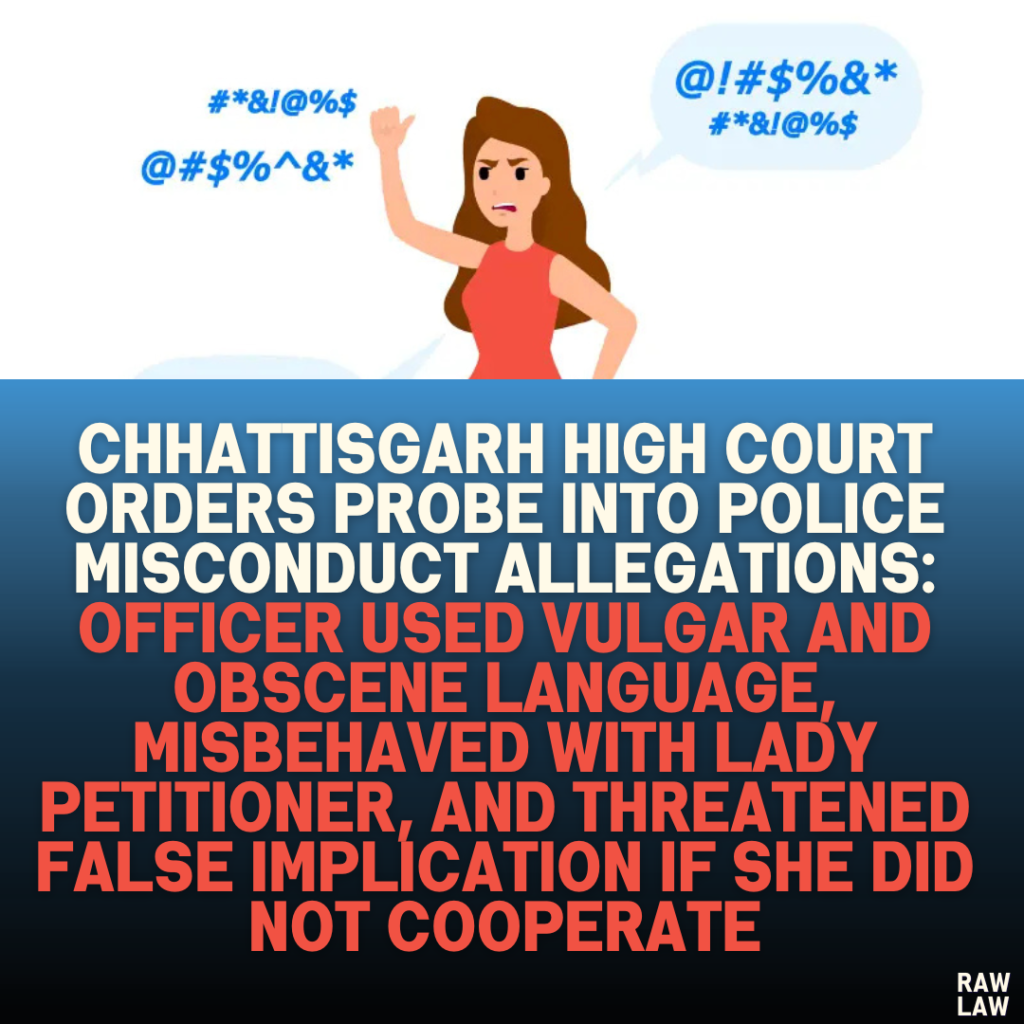Court’s Decision
The Chhattisgarh High Court disposed of the petition with a directive to the Superintendent of Police to examine the allegations of misconduct made by the petitioner against certain police officers. The court emphasized that the investigation must be carried out in accordance with law after both parties are given an opportunity to present their sides.
Facts
- Background of the Case:
- The petitioner had lodged an FIR (Crime No. 224/2024) on September 27, 2024, at Police Station Marwahi, concerning an offense allegedly committed by one of the respondents.
- Following the registration of the case, the petitioner was summoned to the police station for investigation by a police officer (Respondent No. 8).
- Alleged Misconduct:
- At the police station, the petitioner alleged that the officer used vulgar and obscene language, misbehaved with her, and threatened to implicate her in a false case unless she cooperated with the investigation.
- Shocked and intimidated by the incident, the petitioner submitted a formal written complaint to the Superintendent of Police (Respondent No. 4) and later escalated it to higher authorities.
- Subsequent Complaints:
- The petitioner filed her initial complaint on October 3, 2024, and a subsequent complaint on November 7, 2024, to senior officials. Despite her efforts, no action was initiated against the officers involved.
- Court Intervention:
- Frustrated by the lack of action, the petitioner approached the High Court seeking redressal and a directive to register an FIR against the concerned police officers.
Issues
- Primary Issue: Did the alleged misconduct by police officers warrant judicial intervention?
- Secondary Issue: Was the lack of response from the police authorities a breach of the petitioner’s legal rights and procedural safeguards?
Petitioner’s Arguments
- The petitioner argued that her rights were violated due to the police officer’s misconduct and the failure of the authorities to take action despite multiple complaints.
- She requested the court to direct the police to register an FIR against the officers involved and ensure an impartial investigation into their actions.
Respondent’s Arguments
The respondents did not present detailed counterarguments in the judgment. The focus of the order was on addressing the petitioner’s grievance and ensuring procedural propriety.
Analysis of the Law
- Standards of Police Conduct:
- The police are duty-bound to conduct investigations in a professional and ethical manner. Any deviation, particularly involving intimidation or harassment of a complainant, is a serious violation of procedural norms and constitutional rights.
- Legal Safeguards for Complainants:
- Complainants are entitled to fair treatment during investigations. The misuse of authority by police officers, if substantiated, undermines the integrity of law enforcement and erodes public trust.
- Judicial Oversight:
- The court’s directive to the Superintendent of Police underscores the judiciary’s role in ensuring accountability and protecting citizens from abuse of power.
Precedent Analysis
While the judgment does not explicitly cite precedents, the case aligns with established legal principles concerning:
- The protection of complainants from harassment during investigations.
- The obligation of police authorities to act promptly on complaints of misconduct.
Court’s Reasoning
- Acknowledgment of Grievance:
- The court took cognizance of the petitioner’s complaints and the failure of the authorities to act, which justified judicial intervention.
- Directive for Action:
- Recognizing the seriousness of the allegations, the court directed the Superintendent of Police to investigate the matter and ensure that appropriate legal measures were taken after hearing both sides.
Conclusion
The petition was disposed of with the following instructions:
- The Superintendent of Police must investigate the petitioner’s complaints against the officers accused of misconduct.
- After conducting the investigation, the authorities must take necessary legal actions in accordance with the law.
The court emphasized that the investigation should be fair and should consider representations from both parties to ensure justice.
Implications
- Accountability in Law Enforcement:
- This judgment reinforces the accountability of police officers and underscores the importance of adhering to legal and ethical standards during investigations.
- Judicial Oversight in Protecting Rights:
- The ruling demonstrates the judiciary’s role in upholding the rule of law and safeguarding citizens from potential abuse of power by law enforcement authorities.
- Prevention of Police Misconduct:
- By addressing such complaints and ensuring accountability, the judgment aims to deter future instances of police misconduct, thus fostering greater trust in the justice system.
This detailed explanation outlines the court’s approach to ensuring a fair resolution of the petitioner’s grievances and its broader implications for law enforcement accountability.



